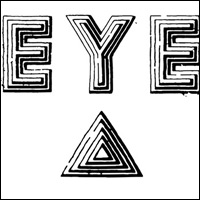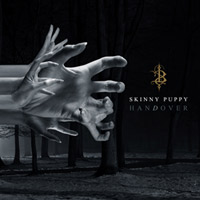
Dark Past
Turnout
You’ve most likely heard of Brite Futures before, or at least their former existence as the meme du jour of 2005, Natalie Portman’s Shaved Head. Legend has it that the rambunctious foursome came up with the name while sitting at a mall food court, with the conceptual focus being “fruit snacks and partying.” Back then, they got more attention for their name than their music, so they did what any sensible band on the cusp of adulthood would do: they grew up, rebranded themselves as Brite Futures, and let the music shine. Sort of.
Dark Past is the second album under the new moniker, and the band is still up to its old hijinks. Brite Futures make cute, funny (after copious amounts of Red Bull and Kamchatka) party music. At its best, it’s disco-infused dance music. At its worst, it’s cringe-inducing. The album begins with a promising genre-melding dance number, “Baby Rain,” which gives way to a few more of the same, including the punchy, sarcastic “Kissed Her Sister” and the electro-infused “Jag in the Jungle.” Really, though, much of the album sounds like these are the same kids sitting in the food court sticking french fries up their noses, except with sophisticated production equipment. The lyrics still center around partying and dancing, and they fall into the trap of rhyming words “just because” (e.g. Zanzibar, Avatar, Zanbar), which makes for more than a few awkward phrases and nonsensical themes. Not that everything has to be serious, but when you start using lines like “we can do each others’ chores” just to create a rhyme, then it becomes frivolous.
There are some saving graces, though, which come in the form of the wordless “Winterlude” and the nostalgia-laced “Too Young To Kill,” which utilizes Beatles lyrics to create an upbeat, existential battle cry for a younger generation. Brite Futures is a band full of capable musicians with a concrete sound, albeit nothing the Rapture hasn’t already covered. That’s a solid foundation to build upon, and it’s not the band name that’s a gimmick anymore, but the songs themselves. Dark Past, for better or worse, hits the proverbial nail on the head when it comes to filling the niche for energetic, farce-driven party tunes. But whatever, thinking this hard sucks. I’m getting back to my beer pong.
Jennifer Farmer

Center of the Sun
self-released
Unbeknownst to most of the world, the little burb of Columbus, Ohio has been the epicenter of metal’s evolution for nearly a decade now. At the beginning of this new wave, there was a triumvirate of bands spanning the spectrum of heavy vibes: the epic virtuoso sprawl of Deadsea (who still exist), the visceral thrash of Teeth of the Hydra, and the freaky psychedelic low-end theories of Pretty Weapons. Though each represented their own charged statement as separate units, this cabal of musicians seemed to thrive as alchemists of metal’s core elements, constantly experimenting, collaborating and pushing each other towards a transcendental summit. It has never been the want for innovation or hipster trends (you won’t find odes to black metal or irrelevant growling) that have propelled them up that mountain as it has been the drive to align the spheres that dominate the genre into one pure and mammoth equinox. It was only matter of time before they joined forces.
EYE arrives as Columbus’ latest supergroup, a trio consisting of bassist Matt Bailey (formerly of TOTH), guitarist Matt Auxier and drummer Brandon Smith (both of Pretty Weapons), who rightfully go above and beyond that peak with their self-released debut, Center of the Sun. At nearly 20 minutes, the title track alone would have sufficed as a perfect example of the exemplary evolution that has manifested in Columbus. The trio’s scope is massive and it’s no surprise that Adam “Smitty” Smith (of Deadsea), who produced the record, also contributes organ, Moog and Arp to accentuate this infinite journey; his band’s Desiderata has become a foundation for this blend of cinematic metal exploration. Within that course, EYE locks the listener into a strand that incorporates everything from Floydian dark space and darker moons, the spastic improvisation of Amon Duul’s Yeti, some effects dabbling befitting Goblin soundtracks, and plenty of shreds just to keep your pulse at a maximum. Of course, any metal band who runs the gamut of influence (with Sabbath always being the bedrock) is subject to comparisons, but with much of today’s heavier heroes (Mastadon, I’m looking at you), the results of such meddling leads to disjointed, usually overdubbed garble with no clear intent. EYE can pride themselves on laying most of Center of the Sun down in one take, which makes the complex fusion changes of “Rik Rite” something to behold. It’s there that the trio shows their chops, splitting hairs between the Mahavishnu Orchestra and the deep grooves of Iommi, Butler and Ward. Having seen EYE perform a number of times, it has become evident that these four songs have become a foundation of perfection. Each time they play live, they strive to make it heavier, more profound, than the last time. If there ever was an anthem for EYE, it would be the ominous march of “Ursuper,” a synchronized headbang that becomes ingrained into the conscious as a sort of aural call-to-arms the more times you hear it.
As omniscient overseer, Auxier leads EYE through a number of insurmountable cosmic valleys and crag-filled sonic terrains with his guitar leads. It’s his forward vision. Even when he looks back to the scratch-riddled records of his cool uncle’s record collection, there’s a movement and a layer you didn’t notice before. The nuance and elaboration of those dominating spheres take on strange formations and deafening power. I’d like to think of Center of the Sun as its own towering monolith, surely to be eclipsed by Columbus metal’s next giant step. Whether that’s another EYE record or a further evolution is anyone’s guess.
Kevin J. Elliott

Everybody Get Close
DFA
Back when the DFA label was at the height of its blog bustin’ powers, The Juan Maclean was a revelation. Though the emergence of unlikely dance champion James Murphy certainly proved anything was possible, there was no way to predict what would happen next. Who could imagine that Six Finger Satellite’s John Maclean would return as a purveyor of house music under a new alias? Maclean quickly proved to be the flipside to Murphy’s LCD Soundsystem. While Murphy seemed to pull his inspiration from the early-80s punk-funk scene, Maclean embraced the sounds of disco and early house. After two well-received albums and a hotly tipped DJ Kicks! session, The Juan MacLean returns with Everybody Get Close, not a proper album, but instead a compilation of B-sides, outtakes, remixes and the tour-only Find a Way EP.
In the past, one of the interesting aspects about the songs The Juan MacLean made was how he packed a dancefloor punch in the length of an average pop song. On this compilation, though, that’s not as much of a concern. The moody “Deviant Device” clocks in at nine minutes, while “Feels So Good” weighs is even longer at nearly 11 minutes. Simply put, Everybody Gets Close may not be a record for the casual fan, though that’s not to say there’s nothing for them to grab onto. The album’s pop friendliness is apparent on the Homes Price version of “Human Disaster” as well as opener “Find A Way.” But in general, the record is concerned with extended workouts and dark grooves. Everybody plays like a collection of lost house tracks from the ’80s, referencing the past without sounding willfully retro.
Dorian S. Ham
MP3: “Everybody Get Close”

hanDover
SPV/Synthetic Symphony
When the air turns crisp and the autumn days become shorter, I inevitably break out the Skinny Puppy records. Maybe Halloween sets the tone for the Canadian band’s eerie soundscapes, or the smell of decaying leaves and the sight of increasingly barren trees call for the bleak industrial strains. As such, the timing for the release of hanDover, the 11th studio album since the seminal industrial group formed in 1982, seems apropos. Delayed because of label woes, the album finds Skinny Puppy continuing to weather the test of time as the genre the band is credited with creating slipped back underground. This record, though, seems more personal than some of their earlier works, even including a tribute to a deceased friend and drum tech with “AshAs.”
Skinny Puppy continues to push the boundaries of electronically derived industrial noise, creating complex, layered cuts, powerful in brute industrial force (“Village,” “Point”) or in their beauty, as is the case with “Wavy.” Punctuated with interludes of tranquil beauty, there’s a mix of both of in the slow-building “Cullorblind” and in the quirky intro of “Gambatte.” If there are a few tracks that seem a bit out of place, it’s because they originally were intended for a noise project and found their way onto hanDover. “NoiseEx” is a seven-minute electronic opus, while “Brownstone” will make you wonder if Ogre is temporarily possessed by Genesis P. Orridge. With handOver, Skinny Puppy is the same venerable old dog, only this time with a few new tricks.
Josie Rubio

Low Roar
Tonequake
It’s hard not to hear the influence Radiohead has had on shaping a whole generation of musicians, the band’s turn-of-the-century malaise and sonic mix of man and machine directly inspiring scads of post-millennial pop of varying degrees of quality. As such, I have little doubt that Ryan Karazija, the man responsible for Low Roar, has spent plenty of time with seminal records like OK Computer and Amnesiac.
Karazija, a San Francisco native and former member of Audrye Sessions, moved to Reykjavik before making this self-titled record, and just like his musical influences, it’s also hard not to hear something of the chilly Icelandic landscape in his songs. There is a sparseness to everything he does, which in turn accentuates his songs’ beauty and poignancy. “Just a Habit” is a perfect example of all these elements. The track begins with just a simple guitar line and Karazija’s vaguely Yorkian voice cast in sharp relief. As the song progresses, small rhythmic elements and synths and keys enter the picture, the austerity dissipating, but not the sense of sadness. “Nobody Else,” which follows is less organic. It’s built atop a mushy drum machine beat, but the machination, in contrasting with Karazija’s voice, ends up emphasizing the humanity of the song. And much of the album is like that, juxtaposed elements ultimately revealing what lies at the heart of the record: a tightly wound ball of emotion that, when Karazija releases it, is hard not to find spellbinding.
Stephen Slaybaugh
MP3: “Tonight, Tonight, Tonight”
ALBUM REVIEWS
Gauntlet Hair, Gauntlet Hair
Strange Boys, Live Music
Spectrals, Bad Penny
The Beets, Let the Poison Out
Björk, Biophilia
Ryan Adams, Ashes & Fire
Real Estate, Days
Jane's Addiction, The Great Escape Artist
My Brightest Diamond, All Things Will Unwind
Crooked Fingers, Breaks in the Armor
Zola Jesus, Conatus
High Places, Original Colors
Paley & Francis, Paley & Francis
Casiokids, Aabenbaringen Over Aaskammen
